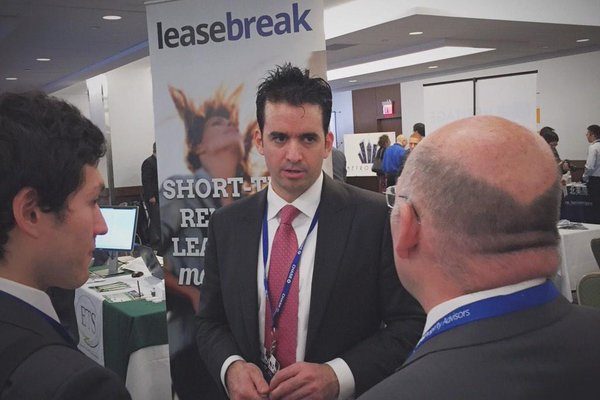When Lia Wayman relocated to Boston three years ago, she thought it’d be a cinch to sublet her New York City apartment. When the process instead turned into a “nightmare,” the 28-year-old teamed up with an acquaintance, Josie Hubschman, and launched the Room Ring, a roommate-matching app.
“It’s a billion-dollar industry,” Hubschman told IVY Magazine in November 2015. “There’s always a wave of different industries: the Ubers, the Hinges and more. There hasn’t been a big wave of roommate-matching apps, and I think it’s coming. I hope we’re a part of that.”
Over the past year-and-a-half, Room Ring paired hundreds of roommates. But facing an increasingly crowded field of apps and startups focusing on rental apartments (and roommate shares), Wayman and Hubschman decided to bow out last week, selling the company to a larger rival, Roomi, which is backed by $6 million in venture capital.

From left: Room Ring founders Lia Wayman and Josie Hubschman (Credit: The Room Ring)
“A lot of people are so desperate that they’re posting on several platforms, so someone who posted on our platform also posted on Roomi,” Hubschman said. “It comes down to who has the best user experience, best branding, best customer service and we believe Roomi is doing it best right now.”
Five years ago, Wayman and Hubschman would have faced a wide open marketplace. But with access to better data — and piggybacking on millennials’ heavy reliance on social media and technology — dozens of companies have sprouted up to pounce on what they say is an opaque, fragmented and inefficient rental market. With a concentration in gateway markets on both coasts, there are roughly 20 such startups in New York City alone, including companies like Nooklyn, Loftey, Oliver, Roomi, Leasebreak, Flip and others.
The influx of new players comes as investors have pumped tens of millions of dollars into the growing “real estate tech” space. But despite all that cash and attention, there are no definitive home runs in the rental space.
“It’s a huge, huge market, but we have not seen a WeWork or Airbnb in the rental space — yet,” said Harley Courts, CEO of Nooklyn [TRDataCustom], a Brooklyn-based listings site. “It is happening. Whether it’s us or someone else, there certainly will be a distinct player there.”
Panoply of pain points
Anyone who’s tried to rent an apartment in New York will understand why entrepreneurs fall over themselves trying to fix the rental experience. The process is notoriously opaque and increasingly expensive: The median price for a Manhattan apartment hit $3,475 in May, up 2.02 percent year-over-year. And that’s not counting broker fees, application fees and all the rest.
Court said Nooklyn’s app has been downloaded 800,000 times, and its site attracts 45,000 active renters each month. “The usage is crazy,” he said. “These are all opt-ins, too, so there’s no hacks here to get people to sign up.”
Ajay Yadav, CEO of Roomi, echoed the sentiment.
“People are experiencing these problems at the individual level and they think, ‘Why can’t we build an app or technology to make it easier.’ It’s full of so many different pain points,” he said.
Most millennials, who are putting off homeownership, are also more comfortable transacting online in a way they weren’t even just a few years ago, said Zach Aarons, a co-founder of real estate tech incubator MetaProp. “People realize that to a certain extent, rental housing is a commodity product,” added Aarons, whose company has invested in lease marketplace Flip. “You can do your own desktop diligence without going to look at the apartment.”

Harley Courts, CEO of Nooklyn (Credit: Twitter)
The need for better data is fueling a wave of consolidation that’s just getting started.
For example, as the co-living startup Common was looking to expand to other markets last year, it realized it lacked information on how to price individual bedrooms in new neighborhoods. “For any project that we would take on, we needed the data,” said CEO Brad Hargreaves.
In September — fresh off a $16 million funding round — Common acquired subleasing startup Skylight, also based in New York, which billed itself as a Tinder for roommates. Skylight had data on room pricing, as well as data points from states outside Common’s existing footprint.
“There’s always a buy-versus-build decision,” Hargreaves said. But, “it takes time to build that experience, and sometimes it’s best to go out and acquire that and bring in people who have experience and who’ve been down the path.”
Yale Fox, CEO of Rentlogic, which uses open data to rate buildings and do background checks, said startups have an edge if they can give renters tools or information they need to make better decisions. “If you can look at the renter and think about what they want,” he said, “you have an opportunity to build loyalty with them.” True power may also lie with landlords, however, as the failed partnership between Rentlogic and Citi Habitats showed. In 2016, Citi Habitats pulled its listings from Rentlogic after pushback from landlords.
Still, the field is increasingly crowded as players jockey for that customer (and landlord) loyalty. While it’s still early days, signs point to more M&A activity.
“It is natural for a very small number of companies to come out on top. It’s a difficult space to master,” said Wayman. “The one service you do use is going to be the one you tell your friends about.”
According to Yadav, the Room Ring acquisition will grow Roomi’s user base, currently at 800,000 users and 250,000 listings around the country – nearly half of that in New York City. “Unlike others, we have the scale and growth momentum — and certainly the financing — to take this further,” said Yadav, who said Roomi is actively looking to acquire other small players.
Meanwhile, real estate giant Zillow Group edged into the space last year when it paid $13 million for New York-based rental site Naked Apartments. Also last year, the startups PadMapper and Zumper, which has raised $39.2 million from investors to date, joined forces in a $10 million deal to fend off the Seattle-based Goliath. “It was ‘get bought or partner up and do something,’” Zumper CEO Anthemos Georgiades said at the time.
There’s also a competing narrative, however.
In the nascent space, more startups are likely to fade away rather than get bought, said Phil Horigan, founder of Leasebreak, who has already seen a pattern. “A company will come into the space, they seemingly take off, the traffic gets better each month for a while, but mostly because they’re paying for Facebook or Google ads,” he said. “Their traffic eventually dies and you never hear about them again.”
Where’s the money?
Despite all the buzz, it’s unclear how profitable rental startups are.
At the time of the PadMapper deal, Zumper, which claims to have a user base of 40 million renters, said revenue grew five-fold from 2015, when it pulled in $1 million.
Nooklyn recently rolled out a payment platform called “Nooklyn Pay,” which processed $1.2 million rental payments in May. Nooklyn collects 1 percent for payments above $1,000 (and a flat $10 below $1,000).
But according to Skylight founder Michael Lisovetsky (who’s director of growth at Common following the startup’s acquisition), a fundamental challenge for rental startups is existential: Once tenants find a room or apartment, they leave your site.
He likened the phenomenon to a leaky bucket trying to collect water. “The better job we did, the quicker users would leave. So it’s tricky to get the user to pay for something,” he said.
Horigan said Leasebreak circumvents that problem by working with landlords and brokers who visit the site daily. “The tenant and renter may be here once a year, but landlords and brokers are here a lot,” he said.

Phil Horigan, founder of Leasebreak (Credit: Leasebreak via Twitter)
Leasebreak has a “freemium” model and charges users for extras, like featuring a listing. The site also generates leads for brokers at $15 to $25 a pop. Horigan, who hasn’t raised outside capital, said being self-funded has helped his bottom line and Leasebreak is on track to be profitable this year. “If we were VC-funded, they’d want us to go big or go home. They wouldn’t be as happy with $20 here or there, and that’s how we’re making money right now,” said Horigan. “These are little numbers, but they add up.”
Still, Citi Habitats’ Gary Malin said the new competitors haven’t yet gained significant market share. “There are not enough of them to impact the business, in my eyes,” he said. “We’re doing more business than we’ve ever done. There’s always new people; way back, Citi Habitats was one.”
CityRealty founder Dan Levy told The Real Deal last month that a new crop of companies sprout up every few years, but few stick.
“They get some VC’s to give them a couple of million,” he said, “they go hot and heavy and then they run out of cash.”
